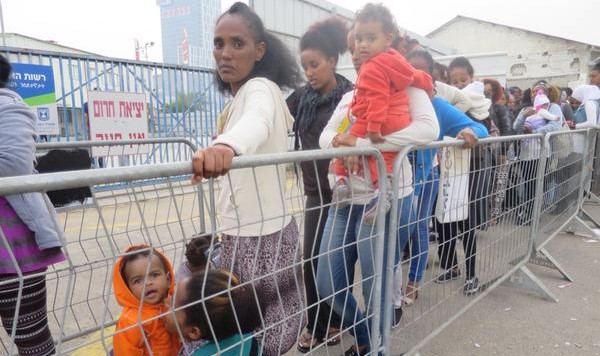Asylum seekers in Israel are “on the brink of catastrophe” according to community members and activists, as the number of infections from coronavirus in Israel continues to climb.
African asylum seekers are facing difficult conditions, including furloughs, inability to receive assistance from the state, a lack of information, and poor housing under extraordinary circumstances. The closure of businesses and institutions that regularly employ asylum seekers is leaving many families worried they will soon be thrown into the street with nothing to eat.

Asylum seekers line up outside Ministry of the Interior facilities in Bnei Brak (Photo: Hotline for Refugees and Migrants)
Approximately 35,000 asylum seekers live in Israel today, most of whom are from Eritrea, as well as a small Sudanese community. For years, Israel has refused to check their asylum requests, leaving them in legal limbo. Over the past decade, the Israeli government has recognized only 13 Eritreans and 1 Sudanese citizen as refugees. Asylum seekers in Israel were hard hit by the COVID-19 crisis. So many people have lost their jobs while having to contend with the unique circumstances of social and economic marginalization.
The NGO ASSAF, which during normal times assists the most vulnerable among the asylum seeker population — survivors of torture, human trafficking victims, and single mothers — is continuing to provide assistance in keeping with Health Ministry instructions. Despite mobilizing funds of millions of shekels, the Welfare Ministry is not assisting at-risk asylum seekers.
For the past weeks, ASSAF and partner organizations have been warning about the issues facing asylum seekers during the Coronavirus crisis. Because of these inquiries, government offices have been examining the possibility of a monthly payment to asylum seekers from the amount accumulated in their “Deposit Accounts” (moneys that have been deducted from migrants’ wages, up to 20%, which they are supposed to eventually collect only when they leave the country. These are very small amounts, but at this time, these payments would be a tremendous help. Professionals agree that without this assistance, the community will collapse within weeks.
Another current step is the creation of a special sub-committee in the Knesset to examine lockdown solutions for asylum seekers who live in dangerous conditions in light of the spread of the virus. It is important to note that the difficult situation asylum seekers are facing today is a result of a terrible long-standing policy, which must end immediately.
“Our goal is to see what is most urgent and how to help. Whether it is bringing food – not knowing if there will be money for it – we will find a solution to deliver food,” Solomon Gebremariam, Reception Manager at ASSAF’s Aid Center, told Social TV International.
Kav LaOved, workers’ rights NGO that assists asylum seekers, is reporting an increase in calls. “We’ve received requests for help from workers in the hotel industry, restaurants, construction and cleaning companies, most of whom have been put on unpaid holiday, and some of whom have been fired effective immediately,” says Noa Kaufman, Kav LaOved’s refugee coordinator. “Some employers, with good intentions, pointed their workers toward employment services or explained how they could get unemployment allowance, but we’ve had to tell asylum seekers that they’re not eligible for all these social benefits.”
Make a donation to support humanitarian aid efforts for asylum seekers in Israel: http://assaf.org.il/en/node/27


